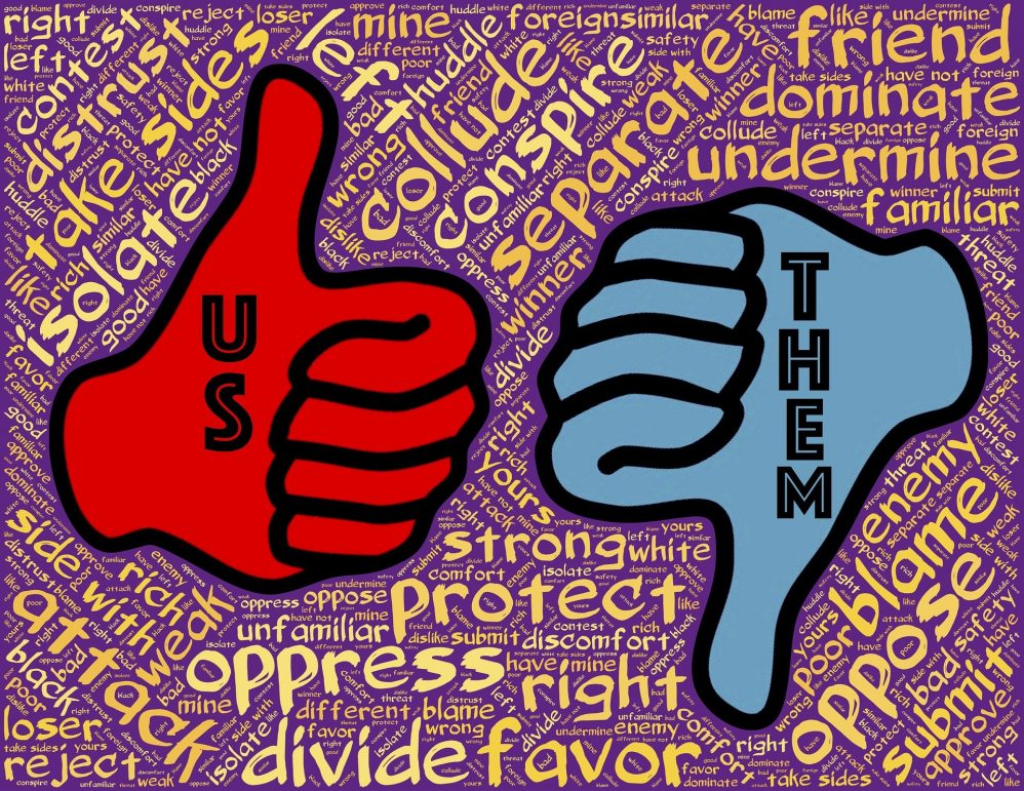Affective Partisanship
Group dynamics and limited choices.

Via WaPo is a piece that describes the foundations of our current political climate, Science is revealing why American politics are so intensely polarized. Basically, it is a combination of evolutionary biology, individual human psychology, group dynamics, and political science.
One theme emerges in much of the research: Our politics tend be more emotional now. Policy preferences are increasingly likely to be entangled with a visceral dislike of the opposition. The newly embraced academic term for this is “affective polarization.”
“It’s feelings based,” said Lilliana Mason, a political scientist at Johns Hopkins University and author of “Uncivil Agreement: How Politics Became Our Identity.” “It’s polarization that’s based on our feelings for each other, not based on extremely divergent policy preferences.”
The tendency to form tightly knit groups has roots in evolution, according to experts in political psychology. Humans evolved in a challenging world of limited resources in which survival required cooperation — and identifying the rivals, the competitors for those resources.
“The evolution of cooperation required out-group hatred, which is really sad,” said Nicholas Christakis, a Yale sociologist and author of “Blueprint: The Evolutionary Origins of a Good Society.”
As I have attempted to describe here on multiple occasions, the attachments are in many ways more like those we see for sports teams. They are based in identity (my side or my team–indeed, often just my laundry, i.e., specific symbols) as much as other factors. It is why changing sides is difficult and why the default behavior is often rationalization about how good your team is or, leaning heavily into notions about how bad the other team is.
The following will sound familiar to OTB readers:
There are two major parties, and their contests are viewed as zero-sum outcomes. Win or lose. The presidency is the ultimate example: There are no consolation prizes for the loser.
So, if you take human beings who behave as per above and give them a two-team contest, you are going to ramp up the tribalism, pure and simple. The choices are: stick with my team, defect from my team/join the other team, or not play the game at all. Since those who choose not to play are passive, the observed game (campaigning, rallies, TV appearance, and voting) is between those two teams, which reinforces the contest. This is not to say they abstainers aren’t insignificant, because they very much are since they shape the final version of the electorate, but simply to note they are more invisible than those who take the field.
As I have repeatedly underscored, proportional representation is not the same kind of zero-sum game and multi-party parliamentarism can provide consolation prizes in terms of cabinet seats in coalitions (although yes, the parties in the minority lose out). This creates a greater diffusion of these strong sentiments based on identity. I am not arguing that they are going away, nor am I asserting that multi-party parliamentary democracies are paradises that cannot have serious problems.
But, as I have repeatedly noted as an example, the far-right in Germany (the AfD) is contained within its own boundaries while in the US the MAGA faction of the GOP has taken over the party, and is threatening, again, to take over the government. This is simply an illustration that structure matters. The mixed-member proportional representation system used in Germany produces a multi-party system for legislative elections, while our system (primaries + single-seat districts + a too-small House) produces a two-party system. Germany’s multipartism is amplified by parliamentarianism and the US’s bipartism is amplified by presidentialism.*
Setting aside my comparative forays that attempt to illustrate there are different ways to do these things,** the evidence is pretty strong that human psychology and group dynamics coupled with a rigid set of two choices is going to produce the kinds of politics we are currently seeing.
“In this political environment, a candidate who picks up the banner of ‘us versus them’ and ‘winning versus losing’ is almost guaranteed to tap into a current of resentment and anger across racial, religious, and cultural lines, which have recently divided neatly by party.”
Binary choices definitionally ramp up the intensity.
And so the piece notes what I continuously note, and already emphasized above.
Here’s where psychology gives way to political science. The American political system may cultivate “out-group” hatred, as academics put it. One of the scarce resources in this country is political power at the highest levels of government. The country has no parliamentary system in which multiple parties form governing coalitions.
Add to this fact the redistricting that ensures there are fewer truly competitive congressional races. The two parties have inexorably moved further apart ideologically, and leaders are more likely to be punished — “primaried” — if they reach across the aisle. And because many more districts are now deeply red or blue, rather than a mix of constituencies, House members have fewer reasons to adopt moderate positions.
Institutional structures matter. And to the point of the article, such structures need to be designed and deployed in accordance with an understanding of human behavior. The structure of incentives in a system matters greatly for the outcomes we have to then live with.
A recent paper published in the journal Science argued that the three core ingredients of political sectarianism are “othering, aversion, and moralization.” Trump has mastered that recipe. He activates emotional responses in his followers by telling them that they are threatened.
“I would give it to Trump: He figured out he could cash in on polarization,” Iyengar said.
Trump, he said, began running for president in 2015 when the country was already divided and he leveraged those divisions. He used inflammatory and racist language that violated political norms, called the media the “enemy of the people,” and promoted a vision of America besieged.
[…]
“We’re evolutionarily predisposed to pay attention to conflict, because we might be in danger. We don’t turn our head really quickly to look at a beautiful flower. We turn our heads quickly to look at something that may be dangerous,” Mason said.
That’s a part of human nature anyone can exploit.
“There are politicians who are good at this,” Mason said. “Trump is the best.”
So, a combination of human psychology, group dynamics, and institutional structures get us to where we are, and it is not an especially comforting recipe.
Allow me to be more explicit than I sometimes am. I am not arguing that a more representative system that provides pathways for more parties would guarantee better governance and policy. I am arguing that such systems increase the odds for better governance and policy.
There is no perfect system of government. After all, government requires people and, in case the reader hasn’t noticed, people are imperfect. The challenge about government in general is who is going to be imbued with power, how long they will have it, and what will they be allowed to do with it. This is a core problem going back to the ancients (as I described in broad brush-stroke here over half a decade ago). Rather obviously, the easiest theoretical solution is a perfect, all-wise king. So said both Plato and Aristotle and at a core level is part of the human impulse for a strong man.*** At a bare minimum, single-person rule is more efficient than the mess that is democratic governance.
But while I recognize (see, for example, another trip down memory lane, especially here, but also here) that democracy has numerous flaws and complexities, I argue in favor of it because, again, I think it increases the probability of good governance (and I think that human history, and contemporary politics, bears that out).
Let me note, too, that a core assumption that guides my thinking is the inherent equality of human beings. Definitionally if all humans are of equal worth in a general sense, then any system of government ought to take that fact into serious consideration. Liberal representative democracy (which includes protections for core rights) is the best system for doing so. Further, it seems logical to me to assert that given the inherent equality of human beings, there is inherent value to the system being adequately representative (I will leave the definition of “adequate” aside given the already significant length of this post, but I will assert that two choices are almost certainly inadequate).
Two parting thoughts.
First, yes, democracy can fall into tyranny if there is a majority sentiment to do away with democracy. This is an inherent, paradoxical flaw to this system. However, I would note a couple of things. One, the probability of such an outcome is small (note the ongoing theme of probability here). Two, if your society is really at the stage where an overwhelming majority wants authoritarianism, your problems are far bigger than the inadequacy of democracy itself to protect you. Third, as bad as it might well be for a majority to do away with democracy, it is far more pernicious if a minority of the population can do so.
Second, reform is hard. But the only way I know to forward change is to expand understanding. Further, I would note that somebody in the 1700s (indeed, many somebodies) wrote to others about the need to do away with monarchy and adopt popular government. They were told: change is hard. There were people in the 1800s (indeed, many people) who wrote that chattel slavery should be abolished. They were told: change is hard. Ditto female suffrage. Ditto ending Jim Crow and Apartheid. Ditto. Ditto. Ditto.
For that matter, when I as an undergraduate it was asserting by many very smart people that Latin America was doomed to centralized authoritarianism. And yet, the region has been largely democratic (warts and all) for many decades now.
As such, if change is needed, at some point that change starts with conversation.
To try and bring this around to what started me writing: there are known aspects of human behavior that can either be channeled in destructive or productive ways. The institutional design of a system creates those channels and we should be mindful of that fact.
*This paragraph attempts to summarize a lot of variables. Obviously, this a a complex discussion. I will underscore that the system used to elect the first (or sole) legislative chamber tends to be the system that most directly influences the structure of the overall party system, not the process of electing the chief executive.
**Which is always the point. I want readers, and eventually the mass public, to understand that there are options and that there are empirically proven outcomes from those options. I am not claiming that those systems would work identically in the US as they do in a given example. But I am claiming that there are clear consequences from specific institutional choices (or, consequences from not making new choices, as the case may be).
***And, by the way, is core to Evangelical theology, as they believe that God is truly sovereign in the universe (and being omniscient, omnipotent, and all-loving) makes Him well suited for the job. Many also believe the Jesus will reign as King over a thousand-year kingdom in the Earth as part of one version of the end times. I bring this up not as a reason to start an anti-religious rant in the comments section (no, really, that is not the goal) but to illustrate the persistence of this notion even in modern polities. It has just shifted, for many people, into the metaphysical realm.






When you peel away the veneer of academic research, this begins to sound suspiciously like “both sides do it, equally”.
It is certainly true that Democrats tend to have contempt for Republicans these days. However, I have yet to run across a Democrat whose contempt is not rooted in “…because they want to do X and persecute Ys and roll back Z, and only shitty people with shitty values could want those things.” This is a far cry from the divorced-from-policy (apart from abortion*) visceral hatred that has consumed the GOP. The asymmetry between “I hate blacks and gays and want to be able to persecute them” and “I hate people who want to persecute blacks and gays” is important.
*Even abortion isn’t really a policy issue. Nobody really cares about fetuses; anti-abortion fervor is about how mean you are allowed to be to unwed mothers, how much men get to control women, and opposing anything Those People care about.
[ETA: which is not intended as opposing Dr. Taylor’s take here, except to the extent that it accepts without comment the symmetry implied by the source material.]
The intensification of zero sum in the two parties structure is generally plausibly compelling, but a point of a fraction of the readership frustration with your ongoing comments on the subject is that one somewhat gets to the point of saying “And?” – although there is merit in continued emphasis it must be recognised.
Well if your audience is academics and elites, perhaps, however I think an historical examination of various structural political reforms may suggest that academic type understanding while likely the core or foundation to build an effort on, that voted changes are sold to voting public without achieving actual understanding, salesmanship….
Of course yes, understood you are a theoretician, not a political practitioner, but repetition of the high level analytical becomes somewhat sterile after a time.
It is of course your blog etc but I think it legitimate feedback that for audiences which you’ve convinced, it trends to sterility and a degree of “So What” in frustration if some degree of practical reform paths are not at least grappled with / explored. As in how does one get there from here sort of question (and the danger of dead-end if you have the academic economist type response of “assume a can-opener” [as my graduate degree is properly economics, this is a self-poking])
It should be intellectually at least interesting as reflection to reflect on how within the very polarised chocie dynamic you have rather well highlighted, reform paths – I would myself guess step-wise evolutions that could undercut polarising dynamics but… this requires more familiarity with mechanics.
@DrDaveT: Your comment is the perfect illustration of the tribalism in reaction…. Quite amusing in some way, but Humans are Humans.
@Lounsbury:
I guessed that someone would be dumb enough to make that claim. I didn’t expect it to be you.
I’m straightforward. I almost entirely vote against Republicans. I’d really prefer that their stated policy choice fails. It’s simple.
D vote is my only choice against. Am I always thrilled for their policy choices? Gods no! Does it align more to my preference? Yes.
I am not a Go Team D!! I’m more a [bleep] Team R. I hate those guys! Everything I hold dear, they are against, so it’s an existential struggle and I vote against.
“It’s feelings based,” said Lilliana Mason, a political scientist at Johns Hopkins University and author of “Uncivil Agreement: How Politics Became Our Identity.” “It’s polarization that’s based on our feelings for each other, not based on extremely divergent policy preferences.”
The tendency to form tightly knit groups has roots in evolution, according to experts in political psychology. Humans evolved in a challenging world of limited resources in which survival required cooperation — and identifying the rivals, the competitors for those resources.
“The evolution of cooperation required out-group hatred, which is really sad,” said Nicholas Christakis, a Yale sociologist and author of “Blueprint: The Evolutionary Origins of a Good Society.”
None of these arguments actually make sense, though. Our politics are more emotion-based now? A hundred years ago in America a black man and a white woman kissing in public would be a death sentence for the black man in most places. Jewish people were the objects of pure snobbery and discrimination. Gay people had to live their lives in private, for the most part.
And the idea that polarization or out-groups are evolutionary is meaningless. It’s like saying the desire for order is an evolutionary trait. But if some people are empathetic ultra-liberals who have very clean bathrooms and others are pure nativists who are slobs, what does a desire for order and purity even mean? The guy who dreams of concentration camps and the person who obsessively alphabetizes their books are the same person?
To me, all of these arguments have come out at a time when nativism and nationalism have become rampant and are at the same time completely and utterly boring and awful. They are ways to attempt to explain racism, cruelty, and conformity by pretending that the people who are trying to reject these behaviors are part of the problem due to polarization (another completely useless term). It’s a way of saying of everything is exactly as dumb and vile as the most pathetic forms of bigotry out there. And that is not true.
@DrDaveT: It is an observation not a claim. The reaction to a structural analysis, the Partisan Tribe has to focus on how the Other Team is Bad, and deserves more blame. The very illustration of the dynamic.
The partisan knee jerks do illustrate however that Pr. Taylor rather does have the work cut out for him, I rather under-estimated
@Lounsbury: I should have gone with the first version of my reply to your “observation”, which was “Only if you completely fail to understand it.”
Or are you actually defending the implied claim of symmetry in the structural analysis?
@DrDaveT: I disagree with your formulation to some degree unless by “do it” you are meaning “believe.” I agree that one side is simply “doing” more bad stuff than the other; however, the formulation that the article discusses happens in affective realms rather than active ones. The article is stressing the relationship between what we feel and the alliances that emerge from it.
The again, as someone who currently is not playing, yeah, I see that both sides “do” it. One side too much; the other, not enough. (I’ll let you decide which team is which and what “it” means.)
This stupid discussion revolves around failure to understand that correlation is not causation.
Would a more representative system of some sort be more hardened to nefarious actors? I can appreciate that the current system naturally leads to a degree of partisan sorting, but there’s no question that there are agents aggressively working to that end, be they billionaires (e.g. Kochs), Russians, nihilists and supremacists (e.g. Bannon and Miller) and others. With tools like social media and nearly endless amounts of money to buy propaganda and politicians outright, can we change the system to address those vulnerabilities?
It’s a somewhat orthogonal question, I suppose, and there are probably other and better ways to try to deal with this issue. But I think it contributes a lot to the problems that this post addresses.
@DrDaveT: I am observing that the focus on ‘implied” “symmetry” and addressing blame (and affirmation of how Bad the other team is, which is of the subject) is precisely the concern of the Team Side, of Tribalism. An illustration of the effect. But obviously very important to you as you need badly for the political analysis to also be one of blame and affirmation of the Good Side. This is however irrelevant to a structural groups dynamics analysis, hors sujet as we say in French.
@DrDaveT:
I did.
This is ultimately about politics, and just proves the point that if you are interested in some actual societal change you should strive to keep your cause from being associated with one party or the other. This partisanship only matters insofar as specific policies become signature issues for the parties.
@Lounsbury: Sorry to burst your bubble, but you on Team Its All About Structure are members of a tribe. Your think your knee-jerk anti-partisanship places you on The Good Side as oppose to those dastardly partisans you are always attacking and need badly to blame.
The AfD is marginalized more by German culture than by its partisan political structure.
In Deutschland, conservatives are willing to lose elections rather than cater to the far right. Merkel came under withering criticism from other conservatives for pro-migrant stances. She refused to budge. German conservatives continue to support the criminalization of Holocaust denial and Nazi rhetoric. Because of all this, Merkel’s conservative Christian Democratic Union party has alienated some of its voters lost its grip on power S holz’s socialists. It did so willingly. The CDU chose principles over power.
In the US, Republicans have mostly refused to place winning behind marginalizing MAGA conservatives. American conservative electeds are not willing to lose their jobs saying no to its xenophobic base, like German conservatives were. In the US, even supposedly reasonable Republicans cater to Confederate Lost Cause bs and slavery denialism, our version of the Holocaust denial that is an anathema in German culture — where it generally accepted that citizens should place the common good over selfish individual gain. Hence why Germans have universal healthcare, robust mass transit, guaranteed housing, free college etc.
So @Modulo Myself is right, Republicans are not potted planets. Unless there is a shift in American culture, rearranging the system and structure won’t do much until American conservatives do not jettisoh their emphasis on winning at all costs, selfishness, individualism, and Confederate-aplogetics.
More viable parties in the US are likely to see America end up not like Germany, but like Israel — where the fanatical right has had a grip on power for nearly two decades thanks to the fractured partisan opposition. Israel could benefit from a more American-like system, that would force the hard right’s opponents to begrudgingly work together under one big tent party.
@de stijl:
I have a certain view of what a better society might look like, feel like.
R’s want the opposite. At least by their proposed policy. In my youth R’s were not awful and fairly reasonable, conservative about money, mostly. In the Reagan era, Jerry Falwell stirred up the pot. Made it biblical and existential. Liberalism is trying to jail you and kill you. You must resist!
That dumb-assery took hold. Like black mold. Slow, silent, inevitable.
@DrDaveT:
Yeah, I don’t buy this.
I hate the GOP because its representatives lie about everything: global warming, the 2020 elections, trickle-down economics, police brutality, etc., etc.
All this is indisputable.
It’s not that Republicans are fallible (we all are), it’s that, fundamentally, they don’t care about truth. At all.
“Politics is all feelings” is the kind off mealy-mouthed bullshit that totally ignores the fact that good governance must be connected to observable reality.
Republicans have deliberately and willfully abandoned this principle.
@DK:
rearranging the system and structure won’t do much until American conservatives jettison their emphasis…etc etc.
This is a very upper-middle class white way of looking at politics. If you’re going to end up doing pretty well regardless of which party wins, it’s very easy to dismiss it as just a game.
I don’t support the Democrats because they’re “my team”. I support them because the Republicans are repeatedly and openly discussing their plans to murder me.
@Stormy Dragon:
You are not alone. You have allies.
@DK: I see Prof. Taylor really has an uphill battle.
The analysis is in groups dynamics, not Partisans versus non-Partians – your comment shows in fact you did not understand the subject in the least.
Tribalism does run profoundly deep to the point that people are unable to analyse structure and need to process structural analysis via My Team Good morality plays and blame / reward.
Mix in emotional appeals to identarian politics and one has a rather completely irrational and non-analytical tribalist responses that completely misapprehend structural analysis of structured group dynamics as moral comment.
Rather sad, the impoverished responses, but chimp band reaction are so deeply rooted in human biology.
@Lounsbury:
It must be lonely up there on your hill fort surrounded by the spasmodic tribals who act in their best interest and don’t value your incisive analysis.
@de stijl:
Hillfort does indeed sound like the name of some 19th century sanitorium lol
@Lounsbury:
As I noted before, you completely failed to understand my comment. Which was, in fact, entirely about the structural analysis and only tangentially about who is right and who is wrong. The asymmetry is in the causal analysis, not the outcomes. (And it’s “hors de sujet”, si vous voulez parlez comme il faut…)
Many of the reactions to this post provide examples of the topic itself – i.e. you’re doing the thing, right now. Strong negative framing. Lack of nuance. Binary perspective. Oversimplification.
That said, the concept of polarization has its limitations in capturing the complexities of the current political landscape. And it is true that the term “polarization” can sometimes imply a false equivalence between the two major political parties, obscuring the significant differences in their approaches and goals.
I talk about this stuff quite a bit with scientists, researchers, authors, etc. on my Outrage Overload podcast.